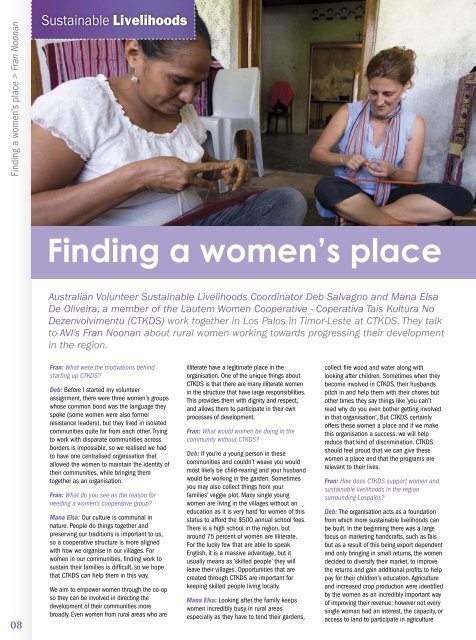Download - Australian Volunteers International
Download - Australian Volunteers International
Download - Australian Volunteers International
Create successful ePaper yourself
Turn your PDF publications into a flip-book with our unique Google optimized e-Paper software.
Finding a women’s place > Fran Noonan<br />
08<br />
Sustainable Livelihoods<br />
Finding a women’s place<br />
<strong>Australian</strong> Volunteer Sustainable Livelihoods Coordinator Deb Salvagno and Mana Elsa<br />
De Oliveira, a member of the Lautem Women Cooperative - Coperativa Tais Kultura No<br />
Dezenvolvimentu (CTKDS) work together in Los Palos in Timor-Leste at CTKDS. They talk<br />
to AVI’s Fran Noonan about rural women working towards progressing their development<br />
in the region.<br />
Fran: What were the motivations behind<br />
starting up CTKDS?<br />
Deb: Before I started my volunteer<br />
assignment, there were three women’s groups<br />
whose common bond was the language they<br />
spoke (some women were also former<br />
resistance leaders), but they lived in isolated<br />
communities quite far from each other. Trying<br />
to work with disparate communities across<br />
borders is impossible, so we realised we had<br />
to have one centralised organisation that<br />
allowed the women to maintain the identity of<br />
their communities, while bringing them<br />
together as an organisation.<br />
Fran: What do you see as the reason for<br />
needing a women’s cooperative group?<br />
Mana Elsa: Our culture is communal in<br />
nature. People do things together and<br />
preserving our traditions is important to us,<br />
so a cooperative structure is more aligned<br />
with how we organise in our villages. For<br />
women in our communities, fi nding work to<br />
sustain their families is diffi cult, so we hope<br />
that CTKDS can help them in this way.<br />
We aim to empower women through the co-op<br />
so they can be involved in directing the<br />
development of their communities more<br />
broadly. Even women from rural areas who are<br />
illiterate have a legitimate place in the<br />
organisation. One of the unique things about<br />
CTKDS is that there are many illiterate women<br />
in the structure that have large responsibilities.<br />
This provides them with dignity and respect,<br />
and allows them to participate in their own<br />
processes of development.<br />
Fran: What would women be doing in the<br />
community without CTKDS?<br />
Deb: If you’re a young person in these<br />
communities and couldn’t weave you would<br />
most likely be child-rearing and your husband<br />
would be working in the garden. Sometimes<br />
you may also collect things from your<br />
families’ veggie plot. Many single young<br />
women are living in the villages without an<br />
education as it is very hard for women of this<br />
status to afford the $500 annual school fees.<br />
There is a high school in the region, but<br />
around 75 percent of women are illiterate.<br />
For the lucky few that are able to speak<br />
English, it is a massive advantage, but it<br />
usually means as ‘skilled people’ they will<br />
leave their villages. Opportunities that are<br />
created through CTKDS are important for<br />
keeping skilled people living locally.<br />
Mana Elsa: Looking after the family keeps<br />
women incredibly busy in rural areas<br />
especially as they have to tend their gardens,<br />
collect fi re wood and water along with<br />
looking after children. Sometimes when they<br />
become involved in CTKDS, their husbands<br />
pitch in and help them with their chores but<br />
other times they say things like ‘you can’t<br />
read why do you even bother getting involved<br />
in that organisation’. But CTKDS certainly<br />
offers these women a place and if we make<br />
this organisation a success, we will help<br />
reduce that kind of discrimination. CTKDS<br />
should feel proud that we can give these<br />
women a place and that the programs are<br />
relevant to their lives.<br />
Fran: How does CTKDS support women and<br />
sustainable livelihoods in the region<br />
surrounding Lospalos?<br />
Deb: The organisation acts as a foundation<br />
from which more sustainable livelihoods can<br />
be built. In the beginning there was a large<br />
focus on marketing handcrafts, such as Tais<br />
but as a result of this being export dependent<br />
and only bringing in small returns, the women<br />
decided to diversify their market, to improve<br />
the returns and gain additional profi ts to help<br />
pay for their children’s education. Agriculture<br />
and increased crop production were identifi ed<br />
by the women as an incredibly important way<br />
of improving their revenue; however not every<br />
single woman had an interest, the capacity, or<br />
access to land to participate in agriculture


